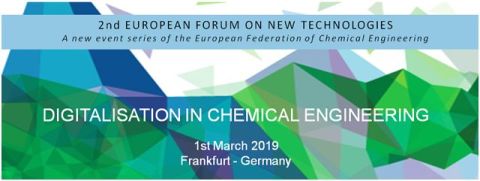Digitalisation
Background
Digitalisation has the potential to change the way we work in Chemical Engineering. In particular it is likely to change the way the process industries work with the potential of big data and its analysis making the operations and the supply chain much more responsive. It could also significantly change the innovation process in developing new products and processes.
Numerous terms are in common use nowadays. It is important to use commonly understood terms and thus standard definitions. A few resources are listed below to help interested engineers and technology strategists:
- Digitization, digitalization, digital transformation: comparative definitions HERE.
- Data science and scientist discussion HERE.
- White papers by McKinsey "Industry 4.0 How to navigate digitization of the manufacturing sector", Deloitte/VCI "Wachstum durch Innovation in einer Welt im Umbruch".
- A maturity assessment from Warwick U. is described HERE.
Survey on Mapping Digitalisation Skills Gap
Digitalisation is a major megatrend of this century and holds the potential to drastically transform various industries and production techniques. However, the pace of adoption of teaching digital technologies at universities is in general very slow, may not meet industry needs, and hence will result in a still wider gap in digitalisation and computing skills.
The aim of this survey is to identify the digitalisation skills gap from both academic and employer perspectives. The results of the survey will assist in the development of a framework that defines the requirements and proposes a structure for the implementation of Digitalisation and Industry 4.0 concepts in the chemical (including biochemical) and process engineering curriculum, teaching material and educational programmes that are attractive to prospective students and prepare them well for future applied smart manufacturing and industrial practice.
EventS
Topics: The Vision for Digitalisation in the Process Industries; The Potential of Digitalisation; the Role of Digitalisation across the Life Cycle: in R&D, Design and Operations; Round table discussions and potential outcomes include proposals, challenges, workshop ideas
SUMMARY REPORT
by the EFCE Scientific Vice President, David Bogle
Publications
Some presentations with future-looking perspectives:
- Pantelides, C.C., 2019. Deep knowledge in process industry digitalization. Link.
- UK Gov, 2017. Made Smarter Review. Link.
- Winter, M., 2019. Digitalization of the European Chemical Industry. Link.
Relevant general articles in the scientific literature include:
- Beck, D.A.C., Carothers, J.C., Subramanian, V.R., Pfaendtner, J.,2016. Data science: accelerating innovation and discovery inchemical engineering. AIChE J. 62, 1402-1416. Link.
- Qi, Q., Tao, F., 2018. Digital twin and big data towards smart manufacturing and industry 4.0: 360 degree comparison. IEEEAccess 6, 3585-3593. Link.
- Venkatasubramanian, V., 2019. The promise of artificial intelligence in chemical engineering: is it here, finally? AIChE J. 65, 466-478. Link.
- Piccione, P.M., 2019. Realistic interplays between data science and chemical engineering in the first quarter of the 21st century: Facts and a vision. ChERD 147, 668-675. Link.
- Piccione, P.M., 2021. Realistic interplays between data science and chemical engineering in the first quarter of the 21st century, part 2: Dos and don’ts. ChERD 169, 308-318. Link.
